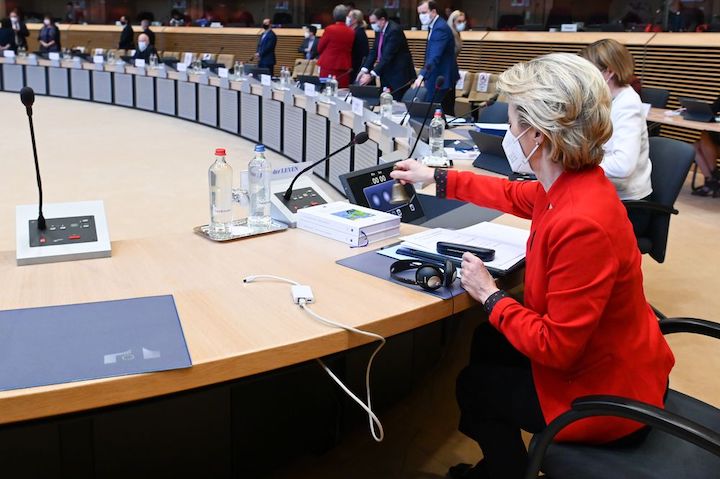EU revives vaccine export fight with U.K. over missing supplies
European Commission President Ursula von der Leyen threatened to withhold vaccine exports from the U.K., reopening a dispute with the British government that has raised tensions between the EU and its former member.
As the European Union struggles to quicken the pace of its Covid vaccination program, von der Leyen said the bloc will consider blocking supplies to countries that aren’t reciprocating or which already have high vaccination rates. She singled out the U.K. as the No. 1 importer of shots from the EU.
“We have observed that in the last six weeks, 10 million doses have been exported to the U.K.,” von der Leyen told reporters in Brussels. “The U.K. is producing AstraZeneca. In our contract with AstraZeneca there are two sites in the U.K. that are put in the contract for potential deliveries to the EU.”

The EU has blamed AstraZeneca’s failure to meet its delivery commitments for the region’s sluggish program. European officials consider that particularly galling when they see Britain’s vaccination rollout doing so much better—thanks in part to supplies coming from the EU.
The bloc hinted at banning exports to the U.K. in January but that prospect faded after von der Leyen suggested she had received assurances from Prime Minister Boris Johnson that AstraZeneca supplies to Europe wouldn’t be restricted.
“If the situation doesn’t change, we will have to reflect on how to make exports to vaccine-producing countries dependent on their level of openness,” von der Leyen said. “We will reflect on whether exports to countries which have higher vaccination rates from us are still proportionate.”
The EU has now administered 11 doses per 100 people, compared to 33 doses in the U.S. and 39 doses in the U.K., according to the Bloomberg Vaccine Tracker.
Earlier on Wednesday, U.K. Business Secretary Kwasi Kwarteng criticized the mixed messages from European politicians over the AstraZeneca vaccine, which has been temporarily suspended by several countries on health grounds.
“You’d have to ask those politicians in Europe about what they’re doing,” he said in an interview with LBC radio on Wednesday. “I think what they’re saying is very, very unhelpful.”
There are are a “lot of mixed signals in Europe,” he said.
Von der Leyen said that EU leaders should consider additional measures to secure vaccine supplies when they meet next week, including the potential use of emergency legal powers to effectively seize control of production and distribution.
“All options are on the table. We are in the crisis of the century. I am not ruling out anything for now because we have to make sure that Europeans are vaccinated as soon as possible,” she said, when asked whether the EU should invoke Article 122 of the EU treaty. The clause allows the introduction of emergency measures when “severe difficulties arise in the supply of certain products.”
European Council President Charles Michel had touted the possibility of invoking Article 122 in January. An official familiar with the matter said then that the measures could help to get the bloc’s vaccination program back on track.
“Vaccine production and vaccine deliveries in the EU must have a priority and I also want to discuss this whole picture with the heads of state and government,” von der Leyen said.
Similar Stories

Amaero secures final approval for $23.5M loan from Export-Import Bank
View ArticleU.S. Bureau of Labor Statistics employment situation
Total nonfarm payroll employment increased by 256,000 in December, and the unemployment rate changed little at 4.1 percent, the U.S. Bureau of Labor Statistics reported today. Employment trended up in…
View ArticleImport Cargo to remain elevated in January
A potential strike at East Coast and Gulf Coast ports has been avoided with the announcement of a tentative labor agreement, but the nation’s major container ports have already seen…
View ArticleS&P Global: 2025 U.S. transportation infrastructure sector should see generally steady demand and growth
S&P Global Ratings today said it expects activity in the U.S. transportation sector will continue to normalize in 2025, with growth rates for most modes of transportation slowing to levels…
View Article
CBP officers seize counterfeit Tiffany & Co. jewelry
View ArticleAAFA applauds USTR on the 2024 Review of Notorious Markets for Counterfeiting and Piracy report
Reiterates need for accelerated efforts to stop dangerous fakes
View ArticleGet the most up-to-date trending news!
SubscribeIndustry updates and weekly newsletter direct to your inbox!





